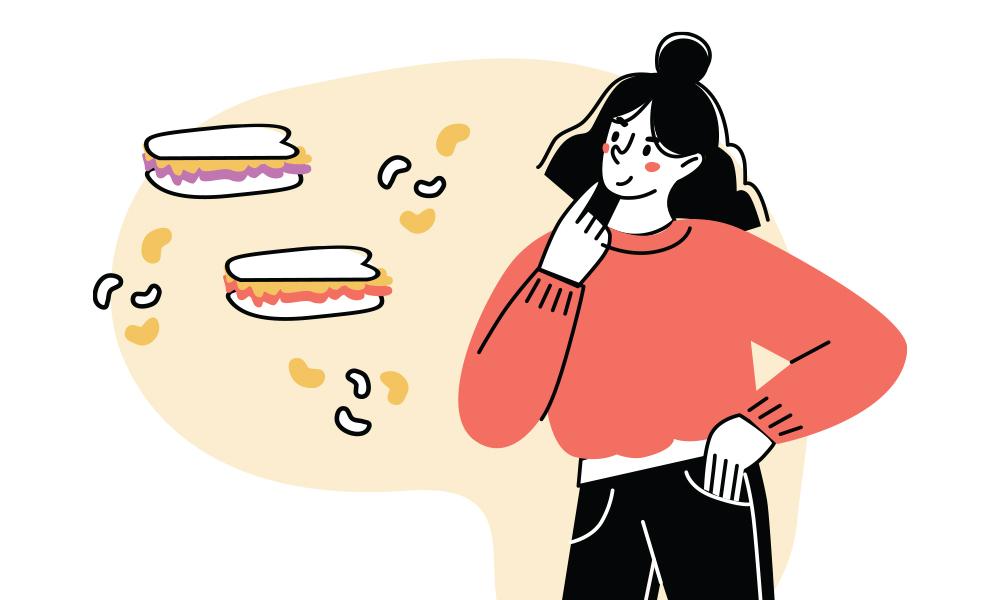
On Peanut Butter Sandwiches & Potato Tots
Finding real food in the Eucharist
Finding real food in the Eucharist
Prior to becoming a parent, I had lots of ideas. Children should sleep all night in their own bed. Children should never have screen time. Children should not leave their shoes on the dining room table. Children should eat what their parents and other adults eat.
Prior to becoming a parent, I had lots of ideas. Children should sleep all night in their own bed. Children should never have screen time. Children should not leave their shoes on the dining room table. Children should eat what their parents and other adults eat.
Of course, it would be great if everyone slept through the night, had minimal screen time and could tie their shoes without propping them up between their toast and juice. However, I now realize that these are long-term goals and kids don’t just learn to sleep overnight (well, actually they do, but I digress).
When it comes to eating, I went from thinking kids should eat just like adults to telling myself that technically, French fries and ketchup began their life as vegetables. We coax our kiddos to try new things, but meanwhile I find myself wanting to snack on their leftovers. With a dozen eggs costing the same as three gallons of gas — finishing the peanut butter sandwich or leftover Tater Tots™ isn’t just tempting — it seems financially sound.
I often find myself absent-mindedly snacking while cleaning up the kitchen, only to sit down to dinner and realize I’m not hungry because I ate too many animal crackers and baby carrots while packing lunches. Then I’ll feel hungry in the middle of the night because I didn’t eat a good dinner, and I fall into a pattern of filling up on snacks that never meet nutritional needs.
In a busy season of life, I realize that this is often how I approach the Eucharist as my spiritual nourishment. Christ is clear in the Gospel of John that he is the source of eternal life, that “Whoever eats my flesh and drinks my blood remains in me and I in him” (6:56). Yet, I can arrive at Mass feeling distracted and simply go through the motions. I’m still thinking of what I watched on Netflix the night before or the headlines my phone was showing me as I silenced it on my way into Church. The noise of daily life can leave my mind full of unhelpful thoughts — crowding out what’s most important and life-giving.
Once I realized that I was ruining my dinner with empty calories, I was still tempted to eat the crusts I cut off the sandwich. It helped to think about how a real dinner was just moments away and snacking in the moment would ultimately leave me unsatisfied.
The Eucharist is truly the “source and summit of the Christian life” (Catechism of the Catholic Church #1324) and that is an invitation to order our lives to receive it with as much awareness and preparation as possible so that we can then witness the fruit it bears in our lives. To acknowledge that the Eucharist is the “summit” of our Christian life is an invitation to see going to communion as the most important act we do. As the “source,” reception of the Eucharist satisfies our spiritual hunger.
Each person is different, but it is worth taking time to examine how we can grow in our appreciation and understanding of the gift of the Eucharist in our lives and what it means for our Christian walk. What is giving temporary satisfaction and distracting us from what we truly need?
While we already fast from food for an hour prior to receiving holy communion, it is helpful to examine what else we can voluntarily abstain from to prepare our hearts to welcome our Lord. Can we give ourselves an hour — or more — without our phones, televisions or radios to create silence for Christ to speak? The Eucharist is the source and summit of our Christian life. How can we grow in awareness and appreciation of this awesome reality?
Alison Blanchet lives in Panama City with her husband and three children. She works as a therapist for children and teens. Email her at alisondblanchet@gmail.com.



